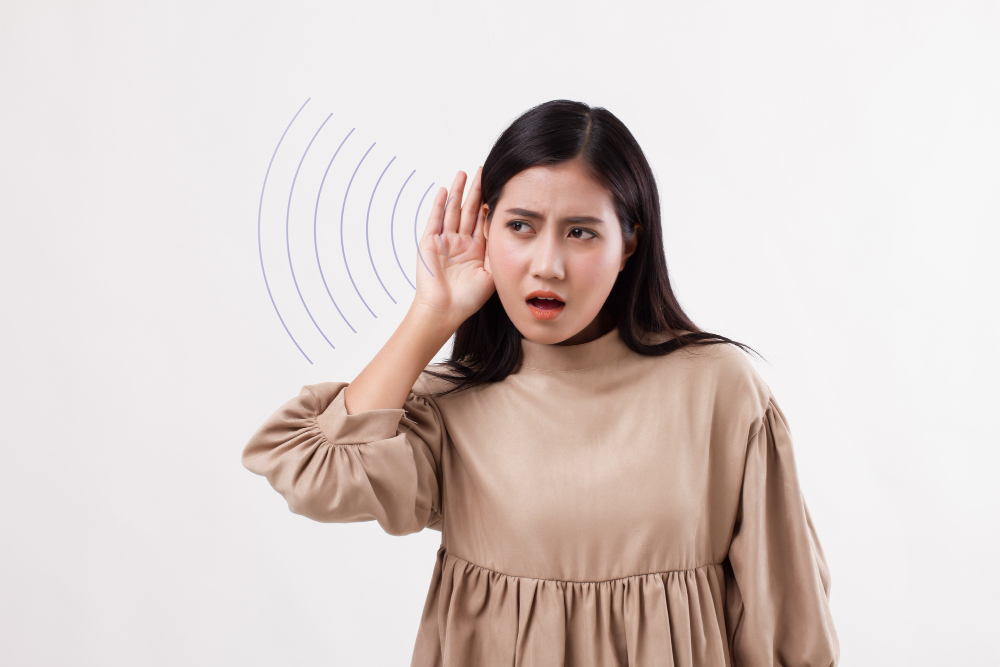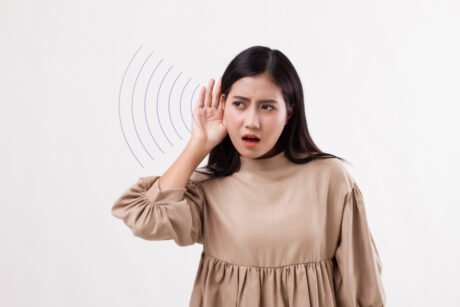It’s a common and sometimes unsettling experience: you’re lying in bed or sitting in a quiet room, and you suddenly notice a rhythmic sound in your ear. It isn’t a ring or a buzz but a thumping or whooshing that syncs perfectly with your pulse. Hearing a heartbeat in your ear can be alarming, leaving you wondering: why is this happening, and is it normal?
While this sensation is often temporary and harmless, persistent or unusual occurrences may signal an underlying issue that requires professional evaluation. This guide helps you distinguish between normal and concerning experiences and explains when it’s time to do a hearing test with an audiology professional.
When is Hearing Your Heartbeat in Your Ear Normal?
For many people, hearing their pulse is a harmless, temporary event. Common situations include:
- Intense physical exercise: Your heart pumps more forcefully, making you more aware of blood flow.
- Lying on your side or pressure on the ear: Compressed blood vessels and muffled external sounds can make your pulse more noticeable.
- Exposure to loud noise: After concerts or noisy environments, your ears may be more sensitive to internal sounds.
- Stress or anxiety: Heightened awareness and increased heart rate can make internal sounds like your pulse more noticeable.
In these cases, the sound usually resolves on its own once you rest, change position, or reduce stress.
When Should I Be Concerned if I Can Hear My Heartbeat in My Ear?
Persistent or new rhythmic sounds in the ear should not be ignored. You should consider seeking professional evaluation if you notice:
- The sound continues for several days or is persistent.
- It occurs in only one ear (unilateral).
- It comes with dizziness, ear pain, fullness, headaches, or vertigo.
- It follows a head injury or sudden health change.
- The pulsing is increasing in volume or frequency.
- You notice changes in your hearing.
If any of these signs are present, it’s important to schedule a consultation with an audiology professional to determine the underlying cause.
What is Pulsatile Tinnitus?
When you notice a persistent, rhythmic sound in your ear or head that matches your heartbeat, this is referred to as pulsatile tinnitus.1 Unlike typical tinnitus, which usually appears as constant ringing, buzzing, or hissing, pulsatile tinnitus is a pulsing or whooshing sound that follows the rhythm of your pulse. This phenomenon is often linked to blood flow near the ear, which is why it is sometimes called vascular tinnitus. People experiencing it may feel as if they can hear their own heartbeat internally.
Causes of Pulsatile Tinnitus
Several conditions and changes in your body can make the blood flow near your ears more noticeable, causing the rhythmic pulsing sound known as pulsatile tinnitus. Some of the more common causes include:2
- Abnormal Blood Vessels (Arteriovenous Malformations): Tangled or unusual blood vessels near the ear can create turbulent blood flow that you hear as a pulse.
- Atherosclerosis: Narrowed or stiff arteries can change how blood flows, creating extra noise in vessels close to your ears.
- Head Injuries: Trauma around the head or ear area can sometimes affect nearby veins and arteries, triggering the sound.
- Increased Brain Pressure (Idiopathic Intracranial Hypertension): Extra cerebrospinal fluid around the brain can press on blood vessels, producing a pulse-like sound.
- Other Medical Conditions: High blood pressure, anemia, or hyperthyroidism may increase blood flow, contributing to pulsatile tinnitus.
While some causes may be harmless, persistent pulsing in the ear should always be assessed by an audiology professional or doctor to accurately diagnose, understand and manage tinnitus, and rule out more serious conditions.
What Can Be Mistaken for Pulsatile Tinnitus?
Sometimes, rhythmic sounds are caused by muscle spasms in the middle ear or soft palate, which can mimic pulsatile tinnitus. An audiology professional can differentiate these during an evaluation. For insights on related symptoms, see our guide on ear pain causes and finding relief.
How Can a Hearing Professional Help?

While temporary heartbeat awareness is often harmless, persistent pulsing should be assessed by a professional to explore what are the available tinnitus relief solutions in Singapore. A thorough evaluation usually includes:
- Detailed Case History: Discuss symptoms, medical history, and lifestyle factors.
- Physical Examination: Inspect ear canals for blockages or infection.
- Comprehensive Hearing Test: Identify conditions like conductive hearing loss and assess how internal sounds are perceived. Additional tests may help match the pitch and intensity of the tinnitus.
Based on the findings, the audiologist will outline next steps. This could include tinnitus management strategies, ongoing hearing aid maintenance, or referral to a medical specialist for imaging and treatment.
Don’t let unexplained ear sounds disrupt your life. A proper diagnosis from an audiology professional is the first step toward clarity and relief. Book a hearing test and schedule a consultation at Listening Lab Singapore today for expert guidance tailored to your needs.
References:










